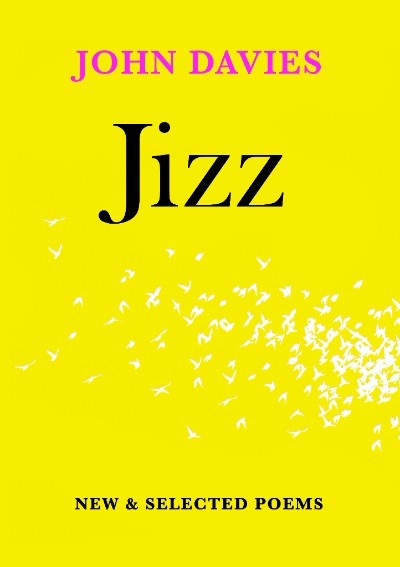Launched in February 2018 from Kingston University Press, John Davies' New and Selected Poems presents a range of his work from 2000-2016. The selection follows the arc of a life, like the flight of a bird, perching at significant moments to observe, explore, question or celebrate. The poems were selected by the editor, Dr David Rogers, Director of Kingston Writing School, Kingston University, who writes:
"John Davies is a versatile and accomplished poet, and in Jizz he again displays his delight of language and his versatility, the confidence that informs the playful inventiveness of his free verse and longer poems matched by his command of conventional forms and metre. His voice is engaging throughout, down-to-earth and witty (hearing him read his poems aloud is a treat), and his attention, whether directed to the past, the present, the political or the personal, is infused with an unsentimental belief in the human desire for relationships and love, which 'chases you and me' and which we chase 'endlessly,' and in the need, no matter what, to 'treasure what [we] have of' it."
‘John Davies is intensely conscious of life’s value and he celebrates it in poems about his parents, in love poems and finally in elegies. In this gathering of work, we see a weighing up of what matters – family, freedom, friends, fun. Poem after poem explores what tenderness means. This is a life-enhancing collection that will surprise you and make you take stock. It is wise, unsentimental, honest and perceptive.’
Jackie Wills
‘John Davies’s fine volume of New and Selected Poems, Jizz, has the appropriate fizz, bustle and energy of small lives in nature. With equal facility the Shedman sheds and dons his alter ego as he traverses through childhood and adulthood, and through life’s unpredictable up-and-down walkways. One of Davies’s many strengths is the way he handles the ironic and the comic with exceptional ease and poise.This volume will make you laugh, reflect, mourn, forgive — but in the end it is a joyous affirmation of life’s essential cycle that is worth the overall sojourn.’
Sudeep Sen, author of EroText (Vintage) and editor of
The HarperCollins Book of English Poetry (HarperCollins)
‘There is a succinct swoop and dive to the orthography of this new collection by John Davies; one which can take in Walden’s Pond with an aerial view before focusing on the subtle complexity of a seal carcass, a “flipper skeleton”.The bird-like is everywhere; Davies alights and tugs at his subject matter, one eye on the reader, before flitting off again, and we are left curious, picking at the abandoned nest. This is a keen and affectionate ornithography of emotional values, cultural shifts. From bird-watcher to birdman, a poet’s dawn chorus to the folk-song of the birds themselves, Davies pitches the familiar lightly and the everyday with evocative simplicity to sing “on a high branch in clear air”.’
MacGillivray, author of The Last Wolf of Scotland (Pighog Press) and The Nine of Diamonds: Surroial Mordantless (Bloodaxe Books)
‘This collection presents a nuanced web-work of familial experience, vivid and detailed, tracing an arc from a welcome to a newborn along to a greeting of parental spirits from the past.The natural world is richly observed, full of aspects of the elements of earth, air, fire, and water in poems alive with colour, texture, and pace. A sparing use of rueful wit plus a varied and strong use of form further distinguish this exciting new collection.’
Penelope Shuttle
‘An impressive collection. Always well-crafted, in a variety of forms, these poems have a powerful authenticity. They sing of the past with a tender, poignant sadness. They sing of the present with intelligence, empathy and subtle wit. They sing of Nature with vivid beauty and they sing of History, Love, Childhood, Birds and Sheds with delicacy, powerful sense of recall, well-chosen, impressive imagery and a wholly convincing humanity.’
Brendan Cleary
‘These poems take us through the scrubby puzzling space of boyhood, beyond the back garden and bus routes to the fields, forests and flowing rivers, to the sea and the acceptance of mortality. They walk beneath a sky of amorphous clouds and birds unshackled on the breeze. They “burrow deep into the cloggy loam” of love and family to move and delight the reader with their wit and tenderness.’
Martin Figura
